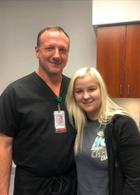
Understanding Hypoglycemia: Dr. Kerry Evans’ Guide To Managing Diabetic Emergencies
Hypoglycemia, commonly known as low blood sugar, is a frequent emergency for individuals with diabetes. It occurs when blood glucose levels fall below 70 mg/dL, often due to excessive insulin, missing a meal, or engaging in more physical activity than usual. Dr. Kerry Evans emphasizes the importance of recognizing and addressing hypoglycemia promptly, as untreated low blood sugar can lead to severe complications, including loss of consciousness.
Identifying Hypoglycemia Symptoms
The symptoms of hypoglycemia can appear rapidly and include shakiness, sweating, confusion, dizziness, and a rapid heartbeat. Some individuals may also experience blurred vision, irritability, or heightened anxiety. If you or someone around you who has diabetes begins to show these signs, it’s essential to take immediate action.
Immediate Response And Treatment
Prompt treatment of hypoglycemia is crucial. The first step is to consume 15-20 grams of fast-acting carbohydrates, such as a small glass of juice, a few candies, or glucose tablets. After 15 minutes, check the blood sugar level again. If it remains low, repeat the process until levels return to normal. Once the blood sugar stabilizes, it’s advisable to eat a snack or meal to help maintain normal levels. Dr. Kerry Evans stresses the importance of these quick actions in managing hypoglycemia effectively.
When To Get Medical Assistance
In some cases, hypoglycemia can become severe, leading to confusion or even unconsciousness. If this occurs, it’s vital to seek medical help immediately. Dr. Kerry Evans recommends having a glucagon injection available, as it can quickly raise blood sugar levels, providing critical time to get further medical care.
Strategies For Preventing Future Episodes
Preventing hypoglycemia is possible through careful diabetes management. Regular monitoring of blood sugar levels, eating balanced meals, and understanding how different activities impact your body are key strategies. For those on insulin or other medications, working closely with your healthcare provider is essential to create a personalized plan that reduces the risk of low blood sugar emergencies. Dr. Kerry Evans advises continuous education and awareness to prevent and manage hypoglycemia effectively.